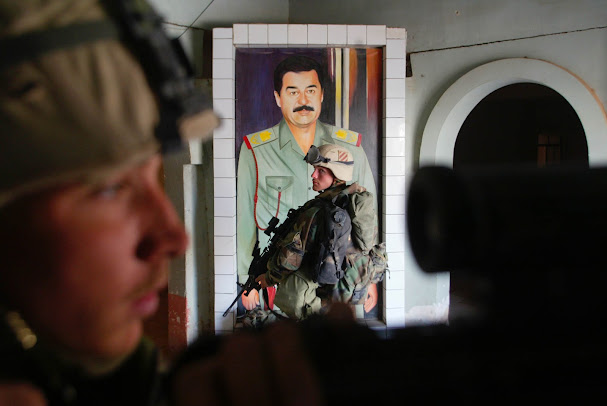''' IRAQ ACHILLES
IRIS* '''
BOOK REVIEW : THE ACHILLES TRAP : SADDAM HUSSEIN, the C.I.A. and origins of America's Invasion of Iraq by Steve Coll. '' Most of the story is vivid and sometimes even funny.''
PEOPLE LOVE to imagine that world affairs are a game of chess, played by judicious leaders trying to outwit each other, acting with perfect self-knowledge and clear understanding of what their opponent might do.
But consider Vladimir Putin, Benjamin Netanyahu or Yahya Sinwar. There can be a tragic mismatch between the interests of a nation and the self-interest of its leaders. The people running the show are people. They act on their whims, and with myopic agendas. They screw up. Call it the frail man theory of history.
This cosmic, unavoidable inefficiency is the real subject of Steve Coll's excellent '' The Achilles Trap,'' a chronicle of the lead-up to the Iraq war. In telling this history, he offers a useful reminder that America's omniscience is just as likely to be overestimated as are the capabilities and intentions of the most world actors.
Coll, a staff writer for The New Yorker and a former dean of the Columbia Journalism School, has written a suite of books about America's entanglements in the Middle East.
'' The Achilles Trap '' is clearly intended as a parallel project to his Pulitzer Prize winning '' Ghost Wars '' a history of the C.I.A.'s role in the wars in Afghanistan. The new book stretches from Saddam Hussein's earliest days in power to the U.S. invasion of Iraq in March 2003.
At its heart lies an engrossing portrait of Hussein, which is drawn from interviews with U.S. officials, U.N. weapons inspectors and surviving members of the dictator's government as well as what Coll calls the Saddam tapes : 2.000 hours of rarely accessed audio from high-level meetings that Hussain ''recorded as assiduously as Richard Nixon.''
The resulting details he assembles gives a more intimate picture of the dictator's thinking about world politics, local power and his relationship to the United States than has been seen before.
The American side of the lead-up to the Iraq war has been well documented, particularly the George W. Bush administration's megalomonicic idealogues and their intelligence failures.
[ And the C.I.A.'s Iraq operation was nicknamed '' The House of Broken Toys '' long before anyone was talking about yellow cake of slam dunks.] Coll briskly moves past those preoccupations, which he chalks up, as others have, to confirmation bias :
The United States assumed that Hussein was lying when he disavowed plans to possess and use weapons of mass destruction because he'd possessed and used them.
The richer narrative vein that Coll explores is the other confirmation bias that's been much less understood.: that of Saddam Hussein, whose great mistake was in thinking that the United States was all-powerful and always competent.
As Hussain later told U.S. investigators about his occupation of Kuwait in the early 1990s. '' If you didn't want to go in, why didn't you tell me?'' Hussein also figured that C.I.A. knew he had no W.M.D.s.
'' A C.I.A.capable of getting such a big question dead wrong on the facts,'' Coll writes, '' was not consistent with Saddam's bedrock assumptions."
The new material captures a trained assassin and rural tribesman who could be sharp and worldly, but was more often erratic and paranoid. He also spent a fair amount of time offering antisemitic rants to an inner circle of mostly frightened loyalists.
Hussein obsessed over Israel and what he saw as the Zionist plot driving much of the West's behavior. In the 1990s, he mocked Bill Clinton for wearing a yarmulke at Yitzhak Rabin's funeral.
In 2001, when one of his cabinet ministers suggested promoting military officers who could speak Hebrew, Hussein shot the idea down, worried that when the officers met their Jewish counterparts their common language would create ''a special psychological bridge between them.''
Unlike his main character, Coll succeeds in part because he has an eye for dramatic irony. As it became clearer in the early aughts that America and its allies would invade, Hussain didn't dial down his public rhetoric in an attempt to stave them off.
In a private meeting in March 2002, as the Saddam tapes reveal, Hussain said that he did not believe a full-scale attack would happen because it would ding Bush's popularity at home.
'' Narcissism is dangerous and can cost a man the opportunity to be wise,'' Coll quotes him saying. Saddam Hussein failed to understand that he might as well have been talking about himself.
The World Students Society thanks Review Author Noreen Malone, the editor of Sunday Business at The New York Times.
With respectful dedication to the Leaders, Students, Professors and Teachers of the world. See Ya all prepare for Great Global Elections on The World Students Society : wssciw.blogspot.com and Twitter X !E-WOW! - The Ecosystem 2011 :
Good Night and God Bless
SAM Daily Times - the Voice of the Voiceless

.png)


0 comments:
Post a Comment
Grace A Comment!